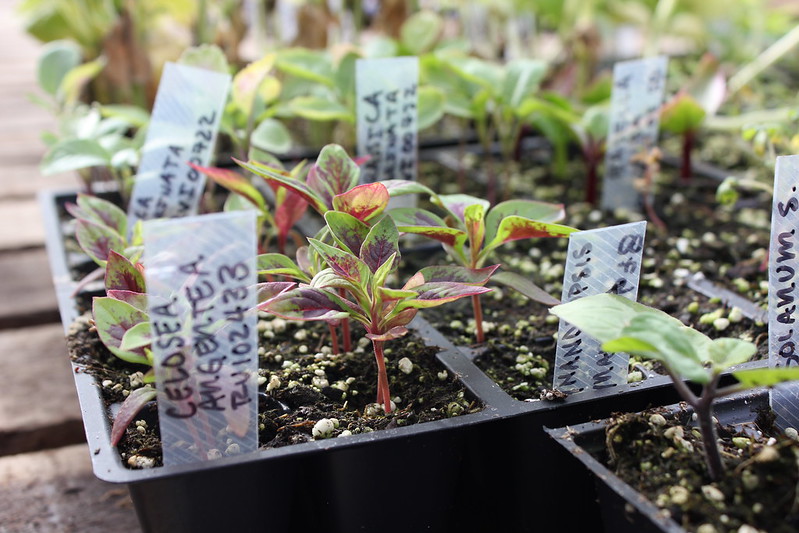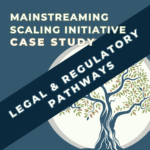Reflections from discussions convened in Cape Town, South Africa – 6 October 2025, sponsored by the CGIAR Scaling for Impact Program and hosted by Responsible Innovations. Authors include Erin McGuire, Ashley Mutiso, Eva Valencia Lenero, Hanna Ewell, Ojongetakah Enokenwa Baa, Dorcas Sanginga, Ana Maria Paez, Julie Newton, Anne Rietveld, Marya Hillesland, Lena Keller-Bischoff, Karen Nortje, Emily Hillenbrand,
A group of scaling scientists, gender specialists, and innovation researchers met in Cape Town, South Africa, to reflect on how agricultural research for development (AR4D) can achieve greater and more equitable impact. The discussion centered on a key question: how can innovation systems become more responsible and effective in the ways they scale?
The concept of responsible scaling offers a framework for aligning innovation with equity and sustainability. It calls for anticipation of potential impacts, inclusion of diverse social groups, reflexivity about institutional and disciplinary biases, and responsiveness to emerging risks and opportunities. Responsible scaling recognizes that scaling is never neutral: it is a social and political process that shapes who benefits, who participates, and whose knowledge counts.
Why This Moment Matters
Across agricultural research and innovation systems, scaling has gained traction as an important mechanism to generate impact through research and innovation. Scaling has centered around technological advances, for example new plant varieties, vaccines, or pasteurization processes – with an underlying assumption that if you build something technologically sound then it will raise all boats as its use increases over space and time. However, we have seen time and time again innovations have unintended consequences and not reach stated beneficiaries of the global development community – such as marginalized populations.
A growing number of scientists and practitioners now recognize that to scale effectively to achieve social goals, one must consider social contexts. Innovation and practices interact with gender norms, market structures, governance arrangements, and power relations, and without attention to these dynamics, scaling can reinforce inequality even as it expands innovation use.
Responsible scaling is therefore essential for achieving the Sustainable Development Goals (SDGs). It demands that innovation processes—from project design to evaluation—explicitly consider social differentiation and environmental limits. This is especially relevant in the current moment, as organizations and donors emphasize “impact at scale.” The challenge is not simply to scale more, but to scale better—with legitimacy, inclusion, and long-term benefit.
The Political and Institutional Dimensions
While technical integration of tools is essential, the conversations in Cape Town emphasized that scaling is ultimately shaped by power relations within organizations and funding systems. Decisions about what to scale and where are influenced by leadership cultures, disciplinary hierarchies, and donor incentives.
Agricultural research institutions remain heavily dominated by biophysical sciences, where quantitative measures of success—such as yield, adoption rate, or cost-benefit ratio—carry more weight than qualitative assessments of equity or empowerment. Social and gender scientists, by contrast, often occupy peripheral roles in program design and resource allocation. This imbalance limits the ability of innovation systems to anticipate unintended outcomes or to design for inclusion.
To make responsible scaling operational, organizations must therefore confront both institutional and political challenges:
- Leadership commitment and accountability. Senior managers need incentives to prioritize inclusion and reflexivity as markers of success, not as optional extras.
- Flexible funding mechanisms. Multi-year resources that allow iterative learning and adaptation are vital for embedding responsibility.
- Cross-disciplinary collaboration. Teams that integrate social, political, and technical expertise are more likely to design scalable innovations that respond to real-world complexity.
- Cultural change. Recognizing and valuing diverse forms of evidence—from participatory data to lived experience—requires deliberate efforts to shift organizational norms.
Practical Pathways: Integrating Responsibility into Scaling
In the Cape Town discussions the group identified a series of practical recommendations for embedding responsible scaling within agricultural innovation systems. These reflect lessons from ongoing collaborations among gender and scaling experts, and from tools developed through global research networks.
- Strengthen and align existing frameworks. Many programs already use methods such as the Innovation Package and Scaling Readiness (IPSR) approach, the GenderUp diagnostic tool, or empowerment metrics like WEAI/Pro-WEAI. Responsible scaling encourages harmonizing these instruments so that inclusion, equity, and social risk assessment become standard components of scaling readiness. GESI-related indicators can be embedded within monitoring and performance systems to track progress consistently.
- Develop a Responsible Scaling Index. To make responsibility measurable, participants proposed creating an index that captures inclusivity and empowerment within innovation pipelines. Such a framework would complement readiness or adoption metrics by focusing on social and institutional conditions that enable or constrain scaling. The index could support accountability, facilitate dialogue with funders, and guide organizational learning.
- Build communities of practice linking scaling and inclusion. A stronger connection between scaling scientists and gender specialists can accelerate systemic change. Establishing communities of practice – across universities, research centers, and development partners – would enable peer exchange, joint training, and shared use of tools. This collaboration should extend to early-career researchers to ensure continuity and innovation in responsible scaling approaches.
- Embed responsibility from the start. Responsible scaling must begin at project conception, not after technologies are developed. Integrating gender-responsive design and social inclusion frameworks early in the research cycle improves both effectiveness and legitimacy. Tools such as GenderUp, Reach, Benefit, Empower and Transform (RBET) Framework and participatory approaches like Gender Action Learning System (GALS) can help teams anticipate social effects and create adaptive feedback loops throughout implementation.
From Technical to Transformative Scaling
The discussions underscored that responsible scaling is not only about integrating gender or environmental safeguards; it is about transforming how impact itself is understood. Instead of equating success with replication or numerical reach, responsible scaling reframes success as the ability to foster equitable transformation within systems.
This transformation involves:
- Re-examining metrics of success. Counting adopters is insufficient; measuring empowerment, legitimacy, and local ownership provides a fuller picture of impact.
- Centering inclusion as innovation design. Human-centered and participatory approaches should inform how technologies and policies are developed.
- Linking research and governance. Scaling outcomes depend on institutional environments—policy incentives, market access, land rights—that extend beyond the research domain.
- Encouraging reflexivity. Researchers and funders must be willing to ask uncomfortable questions: Who benefits? Who decides? What assumptions guide our interventions?
Toward Systemic Change in Agricultural Innovation
Responsible innovation and scaling requires more than new tools – it calls for systemic change in how agricultural innovation is conceived and governed. Embedding responsibility means aligning three interrelated dimensions:
- Institutional: integrate responsible scaling principles into core organizational strategies, funding structures, and performance systems.
- Operational: equip teams with harmonized methodologies, shared learning platforms, and adaptive monitoring systems.
- Cultural: cultivate leadership and research cultures that reward collaboration, critical reflection, and equity outcomes.
Looking Forward
The reflections from Cape Town demonstrate a growing consensus that scaling cannot be separated from the social and political systems that shape it. Agricultural innovation and scaling systems that ignore these realities risk reproducing inequality rather than reducing it. Responsible scaling offers a pathway to rethink impact as systems transformation—aligning scientific excellence with inclusion, responsiveness, and justice.
As agricultural research institutions, funders, and governments work to accelerate progress toward the SDGs, responsible scaling provides a practical and ethical compass. It encourages innovation that not only spreads widely, but also uplifts fairly.
For further reading and tools on responsible innovation and scaling, visit Responsible Innovations, explore the GenderUp and RBET framework, and review empowerment metrics such as WEAI / Pro-WEAI.




